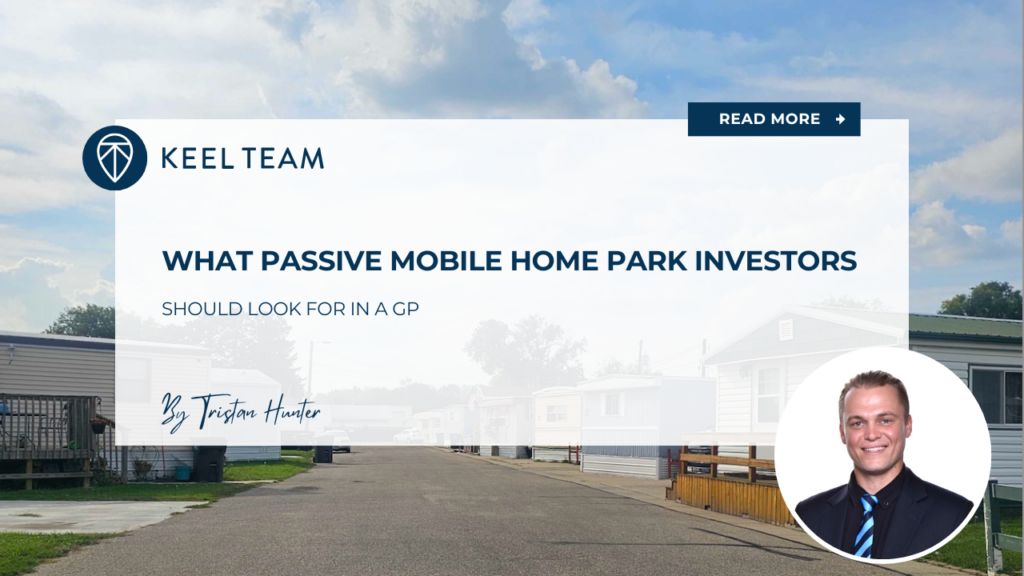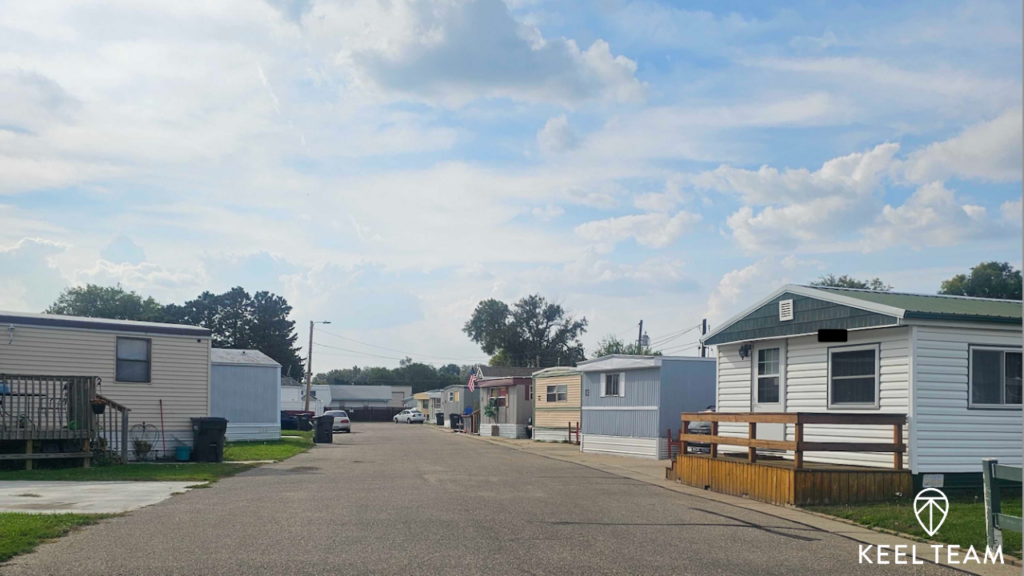What Passive Mobile Home Park Investors Should Look for in a GP
-
 Tristan Hunter - Investor Relations
Tristan Hunter - Investor Relations

Investing in mobile home parks may offer steady returns and the opportunity to support affordable housing. However, the success of such investments could largely depend on selecting the right general partner (GP). For passive mobile home park investors (LPs), finding a GP with relevant expertise, strong values, and alignment may significantly influence the outcome. Below are some considerations that LP investors might keep in mind when evaluating a general partner.
Demonstrated Experience in Mobile Home Parks
One possible consideration is the general partner’s track record with mobile home park investments. A GP with prior experience in managing, improving, and selling or refinancing mobile home parks may provide some reassurance of their capabilities. Investors may want to inquire about the GP’s involvement in full-cycle deals, as this could indicate they have experience with every stage of an investment.
It could also help to look at key metrics such as occupancy rates, rent adjustments, and the number of mobile home parks under the GP’s management. For example, mobile home park REITs have reportedly seen annual rent increases ranging between 3-5%, and trailer parks that are well-managed tend to maintain higher occupancy even during economic challenges. Investors could find it helpful to know whether the GP has achieved similar results in their previous projects.
Transparency and Communication
Communication often plays a crucial role in maintaining trust between the GP and LP. General partners who are transparent and open about both successes and challenges might be seen as more reliable. Investors could consider asking how often the GP shares updates about the project’s operations, financial performance, and any issues that arise.
Some investors could find it useful to receive regular newsletters or have access to financial dashboards to track progress. GPs who are hesitant to share detailed information might raise concerns, so it could be beneficial to gauge their level of transparency before committing.
Alignment of Interests
Aligning the interests of both the GP and LP may be another important factor to consider. When the GP has a financial stake in the project, they could be more motivated to ensure its success. Some limited partners may feel more confident when the GP co-invests in the deal, as this could demonstrate a commitment to the project’s outcome.
In addition to co-investment, fee structures might also be worth examining. General partners usually charge fees for acquisition, management, and disposition, but passive mobile home park investors might want to ensure that these fees are reasonable. A fee structure that rewards the GP more heavily on long-term performance, such as a profit split at the end, could better align interests.
Are you interested in learning more about passive mobile home park investing? Download our FREE eBook and explore this niche asset class!
Experience with Value-Add Strategies
Mobile home park investments often involve value-add strategies, such as improving infrastructure or enhancing tenant management. Investors may benefit from working with a GP who has experience with these types of strategies. A clear plan for increasing the mobile home park’s value and income potential could help create a more successful investment.
Case studies from previous projects might offer insight into how the GP has managed to increase occupancy rates, reduce tenant turnover, or raise rents without negatively impacting affordability. Trailer parks that consistently maintain occupancy rates above 90% may indicate a GP with effective management skills, though it would still depend on many factors unique to each property.
Well-Connected Team and Network
Managing a mobile home park usually requires the support of various professionals, including property managers and contractors. Limited partners could consider whether the GP has a strong network of reliable professionals to handle the day-to-day operations of the asset.
Inquiring about the GP’s relationships with contractors, on-site managers, and other vendors might provide insight into their ability to operate the asset efficiently. A general partner with a well-connected team could potentially offer more value through cost savings and smooth operations, which could contribute to better overall performance.
Conservative Financial Assumptions
Another area worth exploring is the GP’s financial assumptions when underwriting deals. Some limited partners might feel more comfortable with a general partner who uses conservative projections for rent growth, occupancy, and other key factors. Overly optimistic assumptions could pose risks, so LPs may want to ensure the projections leave room for potential challenges.
For instance, rent growth projections that align with industry averages, around 3% annually, might indicate a more conservative approach. Similarly, the exit cap rate assumptions should be reviewed to ensure they take into account possible market fluctuations. GPs who include a slight buffer in their assumptions might offer a greater sense of security to limited partners.

Legal and Regulatory Awareness
Mobile home parks often operate under a range of legal and regulatory requirements, which can vary depending on location. Investors could benefit from working with a general partner who has a solid understanding of relevant regulations. This knowledge may help mitigate risks associated with tenant laws, rent control, and zoning.
Limited partners may want to ask about the GP’s experience navigating these issues. For instance, mobile home park investments in areas with rent control laws may require more careful management to avoid potential compliance issues. A GP with a good handle on local laws might better protect the investment’s long-term stability.
Clear Business Plan and Exit Strategy
Having a clear business plan and exit strategy might also be an essential factor for limited partners. Knowing how long the GP intends to hold the property and under what conditions they might sell it could provide a more comprehensive picture of the investment.
The business plan could outline steps the GP intends to take to add value, whether through operational improvements, infrastructure upgrades, or rent adjustments. A well-detailed timeline of milestones might help LPs gauge whether the investment is on track, although the specific timelines would vary depending on the nature of the trailer park and market conditions.
Final Thoughts
When passive mobile home park investors evaluate a general partner for investments, they may want to consider several factors, from the GP’s track record to their communication style and legal expertise. While no investment can be guaranteed, finding a GP who aligns with the LP’s goals and values may contribute to a more positive investment experience.
By focusing on experience, transparency, alignment of interests, and a strong team, limited partners could improve their chances of selecting a general partner who can guide the project toward potential success.
Book a 1-on-1 consultation with Andrew Keel to discuss:
- A mobile home park deal review
- Due diligence questions
- How to raise capital from investors
- Mistakes to avoid, and more!
Disclaimer:
The information provided is for informational purposes only and is not investment advice or a guarantee of any kind. We do not guarantee profitability. Make investment decisions based on your own research and consult registered financial and legal professionals. We are not registered financial or legal professionals and do not provide personalized investment recommendations.

Tristan Hunter - Investor Relations
View The Previous or Next Post
Subscribe Below 👇





